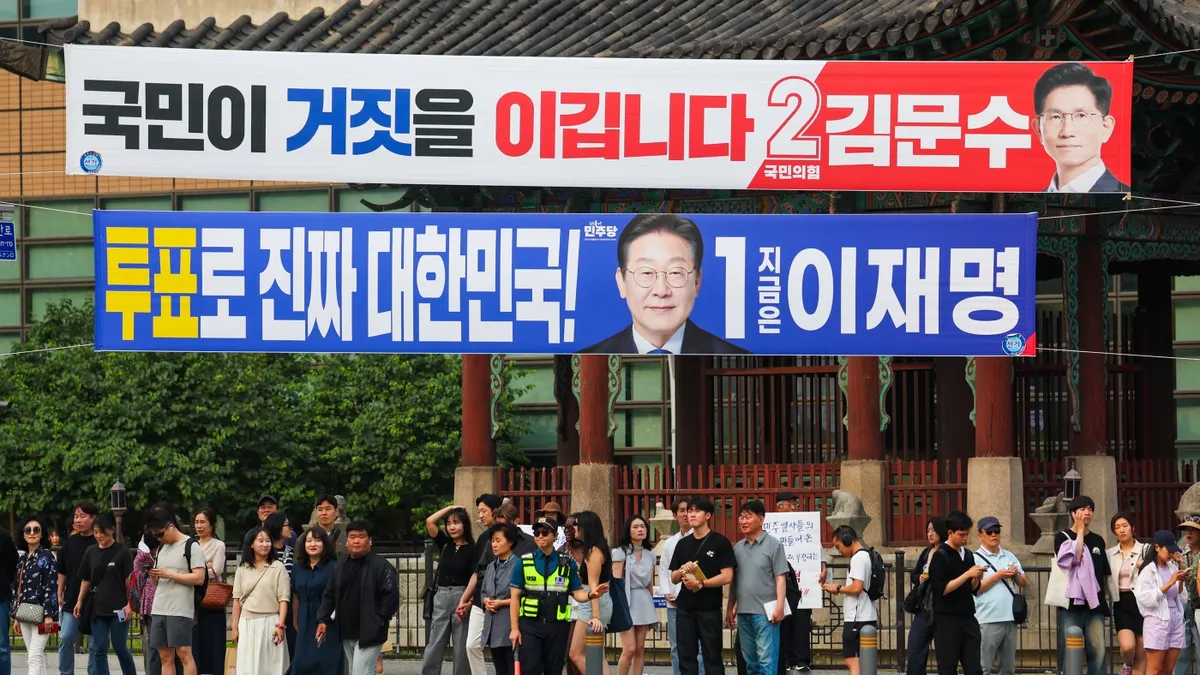
As of today, voting is underway in South Korea to select a new president, marking a pivotal moment in the country's political landscape. This election is widely perceived as a referendum on the impeached president Yoon Suk Yeol and his governing conservative party. The main opposition candidate, Lee Jae-myung of the Democratic Party, has maintained a double-digit lead in the polls over his conservative rival, Kim Moon-soo, throughout the campaign.
The new president will have little time to celebrate, as this election follows closely on the heels of President Yoon's removal from office due to impeachment after declaring martial law in the country. The intense confrontations within South Korea's Parliament and amongst the public regarding Yoon's controversial actions have significantly deepened the nation's political polarization and shaken public confidence in its democracy. This leadership vacuum has coincided with escalating tariff threats from the Trump administration and a growing alliance between North Korea and Russia.
Both leading candidates have promised to work towards uniting the nation, yet they embody the very divisions that plague South Korea. Front-runner Lee Jae-myung has been a vocal critic of Yoon's government, having narrowly lost to him in the 2022 presidential race. During Yoon's presidency, he vetoed a record number of bills from the opposition-controlled parliament, while Lee's party has impeached several government officials. Following Yoon's declaration of martial law, Lee successfully led efforts to overturn it and subsequently participated in Yoon's impeachment.
Lee has framed this election as a choice between a return to insurrectionists and a path towards a rebirth into a new democratic republic. His opponent, Kim Moon-soo, who previously served as Yoon's labor minister, has opposed the impeachment and resisted calls to sever ties with Yoon. In December's emergency parliamentary session, Kim was the only Cabinet member who did not apologize to the nation for the martial law declaration, which has led to a surge in support from conservative voters, despite initial lower popularity among the general public.
According to Heo Jinjae, research director at Gallup Korea, South Korean society has experienced escalating polarization during the three years of Yoon’s administration and the five years of the previous government. In 2016, South Korea impeached another conservative president, Park Geun-hye, over corruption charges, with nearly half of the governing party lawmakers voting for her impeachment. In stark contrast, only about 10% of lawmakers supported Yoon's impeachment, despite the more serious allegations against him.
This time, public sentiment is also notably divided. Polls indicate that while around 80% of South Koreans supported Park’s impeachment, only 60% were in favor of impeaching Yoon. Supporters of Yoon have reacted more fiercely, exemplified by an incident in January where over 100 supporters vandalized a court building following the issuance of an arrest warrant for Yoon.
Experts suggest that the polarization in South Korea is driven more by emotions than by ideological divides. According to Yoo Sung-jin, a politics professor at Ewha Womans University, it reflects a deep-seated animosity towards the opposing side, transforming political discourse into a binary struggle of 'us versus them.'
As the presidential campaign unfolds, Lee Jae-myung has attempted to appeal to moderate voters by emphasizing pragmatism and national interest, even describing his party as center-right. He has pledged to strengthen South Korea's alliance with the United States and maintain trilateral cooperation with Japan, aiming to alleviate conservative voters' concerns regarding his foreign and security policies.
However, if elected, it remains to be seen whether these shifts towards a more conservative agenda will bridge the emotional divide with his staunchest critics. Recent polls reveal that a majority of respondents find Lee unappealing, particularly among young men and older voters who have predominantly supported the impeached president.
Additionally, Lee faces unresolved issues surrounding several court trials related to charges of corruption and election law violations, which he claims are politically motivated. If he assumes office, he will need to address these challenges promptly, as the president-elect of this snap election will immediately take office, bypassing a traditional transition period.